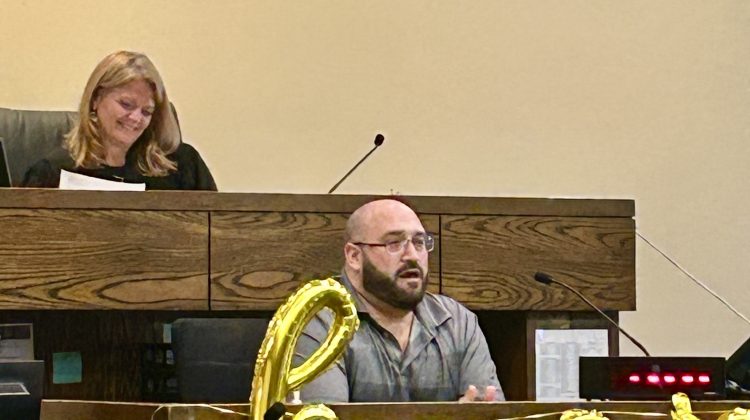LYNN — A full courtroom of people gathered inside Lynn District Court Tuesday to celebrate the graduation of this year’s Lynn Recovery Court participants.
The twelve graduates of the program were Jorge Aurich, Michael Bjork, Dino Errichetto, Michael Fromer, Heather Gagnon, Ashley Giardina, Scott Girard, Kristen Grover, Sarah Tamburello, Willis Taveras, Jenell Thames, and Branden Vernon.
“This is a celebration, a huge accomplishment,” said Melissa Foss, a recovery coach. “They learn their journey to recovery and a lot about themselves.”
Foss, along with others from the Recovery Court team, works closely with participants throughout their time in the program. “They utilize us a lot with probation and like other goods and resources,” she added.
Among those present were community members, treatment providers, court officials, and law enforcement, all of whom play a role in what organizers call a “team approach” to recovery.
Mayor Jared Nicholson said he was excited to celebrate “the hard work and commitment that made today possible.” He applauded both the work of the participants and the dedication of service providers.
“We look forward to graduation every year because it is a culmination of a lot of hard work by both the graduates and the dedicated folks that work with the Lynn District Court,” said State Representative Daniel Cahill. “And we wish them all the best of luck.”
Presiding Judge Kimberly Foster opened the ceremony with gratitude and reflection, praising those who have completed the intensive Recovery Court program.
“Graduates, your commitment to sobriety and engaging in treatment and following all of the Recovery Court rules has led you into this life in recovery,” Foster said. “Sobriety is just the start. … It is the seed that grows the tree of recovery.”
The Lynn Recovery Court was established in 1999 and is one of many such programs across Massachusetts aimed at addressing substance use disorders and related offenses through an intensive, treatment-focused alternative to incarceration. The court uses a structured, phase-based approach that includes drug testing, treatment placements, and case management tailored to individual needs.
“Our participants begin to grow their recovery capital,” Foster said. “I might be a little biased, but I do believe that we have the best recovery court team and a community that cares.”
The ceremony included remarks from Scott Romanovitz, a recent Recovery Court graduate who shared his journey through addiction, homelessness, and eventual recovery.
“When I started in Recovery Court, I was coming in as a transfer from Salem on probation violations,” he said. “Drug use has always been part of my history.”
Romanovitz recounted relapses, personal losses, and legal challenges before finally finding support through the court and recovery community. After multiple treatment programs and setbacks, he found healing at the Meridian House in East Boston — a place he had once feared.
“My first day at Meridian House, I begged to be put back in jail. I said, ‘I’m not staying in this house,’” he said. “But because of my recovery coach and the people I had trusted, I changed. I became a different person.”
Now sober and working to support others in recovery, Romanovitz closed his remarks by expressing deep gratitude for the team that helped save his life.
“Because of people like them, I’m sitting here four months sober today,” Romanovitz said. “And I still go back there regularly to help people who need help. I wouldn’t be sitting here today without them.”
An attendee of the ceremony, Vidal Sattiewhite, said that the Recovery Courts program “changed my life.”
Another attendee, Roberto Baez, said, “It is a step toward a better future for us.”
As Judge Foster reminded all in attendance, “The success of one is the success of all of us. We inspire each other just by watching.”

